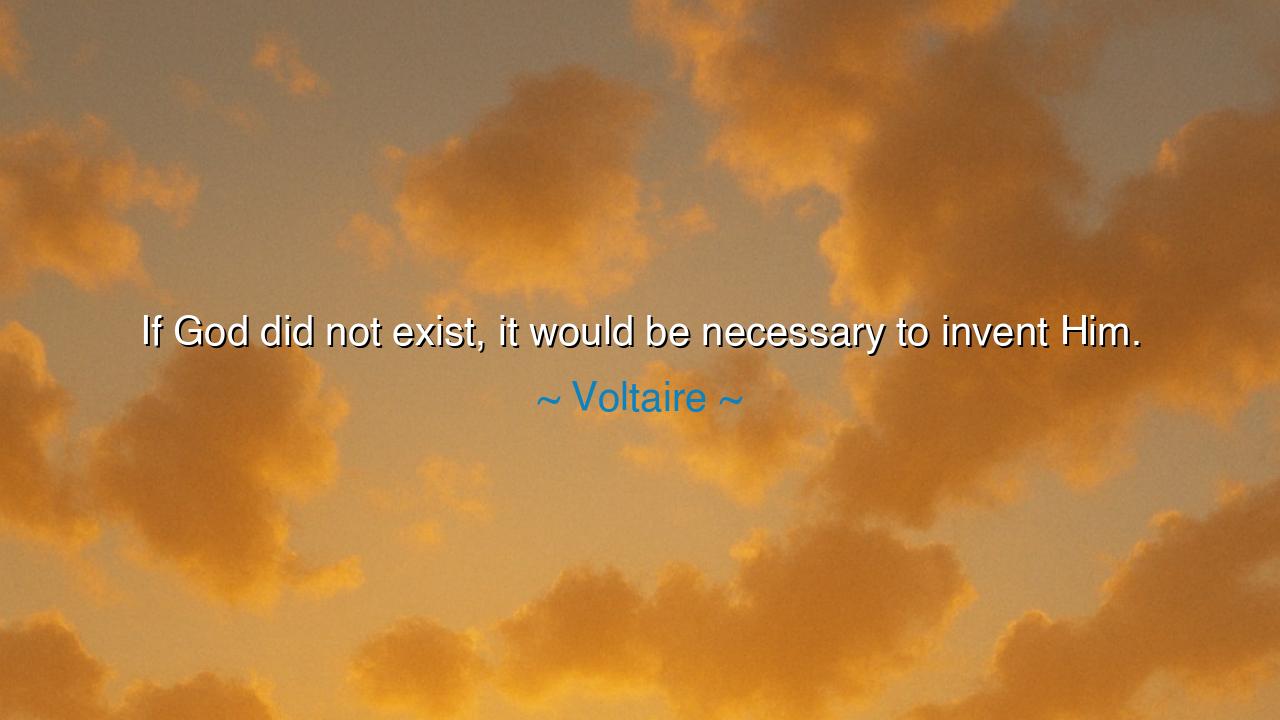
If God did not exist, it would be necessary to invent Him.






“If God did not exist, it would be necessary to invent Him.” — thus wrote Voltaire, the fiery sage of the Enlightenment, whose wit and wisdom illuminated an age torn between faith and reason. These words, though often mistaken as a denial of God, are in truth a confession of the human soul’s need for the divine. In this statement, Voltaire recognizes that belief in God is not merely a theological notion but a moral necessity — the cornerstone upon which justice, virtue, and society itself are built. Without the idea of a higher power, he warns, humanity would descend into chaos, for man left alone to his own devices would lose the compass of conscience and the light of purpose.
The origin of this quote lies in Voltaire’s letter written in 1768, addressed to a prince who had embraced atheism. In that age, reason had begun to challenge faith, and philosophers debated whether mankind could live rightly without religion. Voltaire, though a critic of the Church’s corruption, was not blind to the peril of godlessness. He had seen how greed, tyranny, and cruelty could flourish when men believed themselves accountable to no one but themselves. Thus, with the sharp pen of reason and the heart of a moralist, he declared that even if God did not exist, humanity would have to invent Him — not as a delusion, but as a safeguard against its own darkness. For Voltaire, belief in God was the foundation of order, morality, and meaning.
To understand this wisdom, one must first grasp the world from which it arose. Europe, in Voltaire’s day, was awakening from the long night of dogma. Science, philosophy, and liberty were breaking through the old walls of superstition and tyranny. Yet in their zeal to dethrone ignorance, some sought to dethrone faith itself. Voltaire, though an enemy of fanaticism, saw that pure reason without reverence becomes cold, and freedom without morality becomes anarchy. “You may tear down the temple,” he seemed to say, “but do not destroy the idea of the divine, for it holds the world together.” In his words, God is not a superstition, but a necessity — the guardian of conscience and the keeper of peace.
Through the centuries, history has proven the depth of Voltaire’s insight. When men have sought to erase God from the hearts of nations, the results have been catastrophic. Consider the French Revolution, which came scarcely a generation after Voltaire’s death. In their fury against monarchy and church, the revolutionaries proclaimed the “death of God” and enthroned Reason itself as goddess. What followed was not freedom, but terror — blood flowed in the streets, brother turned upon brother, and virtue was drowned in vengeance. The collapse of faith had left a vacuum that reason alone could not fill. Voltaire’s warning had become prophecy: without belief in something higher, man’s passions devour him.
Yet this teaching is not meant only for nations; it speaks also to every human heart. If God did not exist, it would be necessary to invent Him, because every soul needs a north star, a presence greater than itself to strive toward. Even those who deny God often create gods of their own — wealth, power, beauty, ideology — idols that promise purpose but leave the spirit empty. The human heart, made for worship, will always bend its knee to something. Thus, Voltaire reminds us: better to bow to the eternal than to become enslaved by the temporal. For in the belief that there is a divine justice, man finds the strength to be just; in the belief that there is eternal meaning, he finds the courage to live rightly even when the world is cruel.
To say that God must be invented is, then, not to mock faith, but to recognize its necessity. Whether one believes or not, the idea of God gives shape to human hope, order to human law, and dignity to human life. It tells the child that goodness matters, the sinner that repentance is possible, the sufferer that his pain is not in vain. It keeps alive the ancient truth that man is more than flesh and bone — he is a creature made for wonder, for compassion, for eternity. Even reason, in its highest form, bows before mystery; for what is the pursuit of knowledge if not a search for the divine mind behind creation?
So, my child, take this wisdom not as cynicism but as counsel. Do not mock the faith that sustains mankind, nor cast aside the sacred when the world tempts you with doubt. Whether you call Him by name or simply sense His presence in the order of things, know that the divine idea is the heart of all harmony. Without it, morality withers, and love loses meaning. Seek truth, but seek it humbly, for in every truth is the breath of the One who gave it.
And remember Voltaire’s enduring lesson: the world cannot live without God. You may not see Him in the clouds or temples, but you will feel His absence in your own heart if you live without reverence. Let your reason be guided by faith, and your faith be enlightened by reason. For in this balance lies wisdom — the wisdom that has sustained mankind through all ages. And perhaps that is what Voltaire meant most of all: that even if men could forget the name of God, they would still need His light to walk through the darkness.






AAdministratorAdministrator
Welcome, honored guests. Please leave a comment, we will respond soon